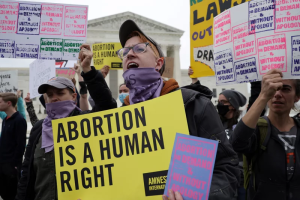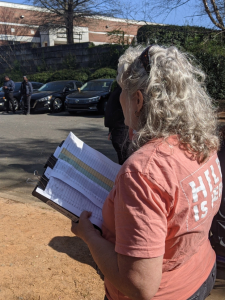My body, my data, my choice: How data science enhancements threaten privacy to reproductive healthcare
Anonymous | June 23, 2022
Tweet: How surveillance technology and facial recognition software has entered the conversation of reproductive health care, and why the right to liberty and privacy is at stake
In May of 2022, a draft opinion of the Supreme Court’s previous ruling of Roe v. Wade [1] was leaked to the public, indicating that it is possible US citizens (particularly women) could lose the right to privacy towards reproductive health decisions such as abortion.

While this decision has not been confirmed, there have been an uproar of social conversations how families may be criminally prosecuted for seeking abortions where it is legal, and how facial recognition and other data science advancements may be used as evidence to criminally prosecute or penalize them. This recent development towards reproductive privacy demands that the right to privacy be protected on a federal level to preserve America’s fundamental right to liberty.
Since the ruling of Roe v. Wade was established in 1973, the topic of abortion and reproductive health care has been deeply politically charged. It has often threatened the separation of church and state, compelling states with social cultures more intrinsically based in religion to make legislative decisions that protect life, compared to states with larger liberal populations which make legislative decisions that protect choice. Since the Supreme Court’s ruling almost 50 years ago, reproductive rights has been a constant topic in presidential elections, and is often used as a divisive measure of discussion to win votes (or sabotage their opponents). So, with the draft opinion being released of its potential overruling, the conversation regarding the threat to individual privacy has started anew, but this time the public has realized how data science and technological enhancements have a potentially menacing part in the conversation.
While it is not uncommon for pro-life protestors to be stationed outside of reproductive health clinics such as Planned Parenthood, these “peaceful” protestors have started to use facial & license plate recognition software to track and monitor those who seek reproductive health care from these locations [2]. While currently all U.S. citizens have a protected right to seek an abortion, the overturning of Roe v. Wade could mean that the information and data collected by these protestors could be used as criminal evidence. Even if someone chose to get an abortion in a state where that right is protected, they could still be recognized with these surveillance techniques and penalized upon returning to a state with different legal jurisdiction.

Unfortunately, the concern for privacy doesn’t stop at facial or license plate recognition. Even indirectly associated services such as menstrual cycle monitors, private messaging, or search history logs could contain enough information to serve as evidence to assess if a user may have aborted a pregnancy. Without a clear understanding of how people could be criminalized with this information, any or all data collected could be used as social or criminal retribution and could deprive Americans of their 14th amendment right to “life, liberty, or property without due process of law” [3].
All things considered, if Roe v. Wade were overturned, there is still the option that various state legislatures could protect the right to abortion, however the right to individual or corporeal privacy would be lost. Roe v. Wade may explicitly protect reproductive rights, but its absence could create a chasm towards protecting individuals’ right to corporeal, mental, or emotional privacy. Regardless of the Roe v. Wade decision, there needs to be federal legislation protecting the right to privacy. Without a federally imposed safeguard for individual privacy, especially considering the growing enhancements of artificial intelligence, Americans could lose their basic liberty and could be socially or criminally penalized simply by making decisions for their mental, medical, or familial well-being.
For those who are want information regarding safeguarding privacy while seeking reproductive health care, visit the Digital Defense Fund [4].
[1]. Roe v. Wade – Center for Reproductive Rights
[2].Anti-abortion activists are collecting the data they’ll need for prosecutions post-Roe
[3].Due Process and Equal Protection | CONSTITUTION USA with Peter Sagal | PBS.
